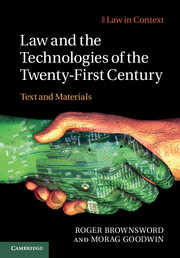Book contents
- Frontmatter
- Contents
- Acknowledgements
- Miscellaneous Frontmatter
- Abbreviations
- Table of cases
- Table of statutes and other public documents
- Part I General introduction
- Part II Regulatory prudence and precaution
- Part III Regulatory legitimacy
- 8 Key boundary-marking concepts
- 9 Human rights as boundary markers
- 10 A look at procedural legitimacy: the role of public participation in technology regulation
- Part IV Regulatory effectiveness
- Part V Regulatory connection
- Concluding overview
- Index
- References
8 - Key boundary-marking concepts
Published online by Cambridge University Press: 05 August 2012
- Frontmatter
- Contents
- Acknowledgements
- Miscellaneous Frontmatter
- Abbreviations
- Table of cases
- Table of statutes and other public documents
- Part I General introduction
- Part II Regulatory prudence and precaution
- Part III Regulatory legitimacy
- 8 Key boundary-marking concepts
- 9 Human rights as boundary markers
- 10 A look at procedural legitimacy: the role of public participation in technology regulation
- Part IV Regulatory effectiveness
- Part V Regulatory connection
- Concluding overview
- Index
- References
Summary
Introduction
In 2010, the Nobel Prize Committee awarded the prize for medicine to Robert Edwards, the British pioneer of in vitro fertilisation (IVF) treatment. The Vatican reaction was swift. The head of the Pontifical Academy for Life, Ignacio Carrasco de Paula, described the award as ‘completely out of order’, as without the work of Dr Edwards ‘there would not be a large number of freezers filled with embryos in the world’. In making his comment on the decision to honour Dr Edwards, Bishop Carrasco de Paula is using the concept of the sanctity of life, or what we shall term below as ‘human dignity’, to determine the boundary of what he finds morally acceptable or legitimate. The concepts that we use in discussions about technology regulation to mark the boundary of legitimacy are the subject of this chapter.
Such moral concepts help us to determine what technology can be licensed, what cannot be entertained, and how far we can go. They determine the boundary of what can be permitted: although a technology may be allowed, there may be limitations to its use or development; or attempts made in regulation to mitigate certain unhappy or unhealthy consequences. We determine these limits by reference to what we term here as our ‘boundary-marking concepts’, i.e. those concepts that are most commonly used by participants in debates about the legitimacy of technological developments to mark the outer limit of moral acceptability. These concepts are used by participants because they give expression to beliefs or understandings that we find intrinsically valuable, that have, in the language of Ronald Dworkin, a touch of sacredness about them for the role they play in human life.
- Type
- Chapter
- Information
- Law and the Technologies of the Twenty-First CenturyText and Materials, pp. 188 - 224Publisher: Cambridge University PressPrint publication year: 2012



